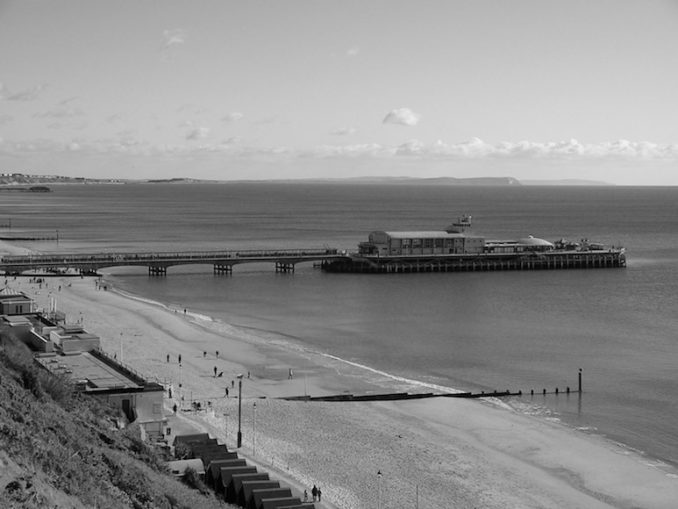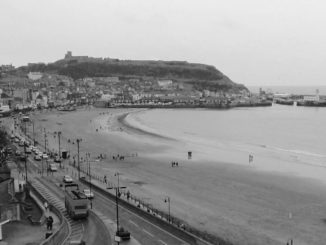In 1954, the Manchester Evening News launched a “Special Investigation” and tasked my uncle, John Alldridge, with answering the question –
Holidaymakers, do you get value for your MONEY?
What follows is his report on Bournemouth. It gives a good idea of what holidays were like 65 years ago. Jerry F
Bournemouth: Prim, proper, but plenty of new ideas
If it is true that good Americans, when they die, go to Paris then the average middle-class upper-income-bracket Englishman’s idea of Heaven must Bournemouth. Each year two thousand more of them settle down thankfully in these Happy Hunting Grounds.
Here, among the whispering pines, the sedate parks and bowling greens, the elderly and the retired find a wistful Nirvana.

Bournemouth Pier,
Xgkkp – Licence CC BY-SA 3.0
Bournemouth is our best example of a seaside “new town”. A wild piece of moorland on which the bustards were still found in 1811, it had become by 1951 a town of over 144,000 inhabitants, 11% of them officially classed as “males (over 14) who have retired from previous gainful occupation”.
It was the railway that put the town on the map: the first station was opened in 1870, when the population was still less than 2,000. But even after the railway reached it, Bournemouth remained out of reach of of the day-tripper
This stand-offishness to a certain extent it still retains. Just as it has preserved the almost monumental calm of the early 1920s, when the best of Bournemouth was built.
Prim and Proper
Not surprising then that at first sight Bournemouth has a stiff, old-maidish look. A town which at one o’clock reverberates with the booming of brass gongs calling the faithful to lunch. A prim-and-proper town, full of neat little signs that warn you to Keep Out or Keep Off, where even the floral set-piece in those lovely Pleasure Gardens spells “Keep Britain Tidy”.
“We exist to dispense health and pleasure,” I was told, rather severely, by one of the town’s officials – himself nearing the retiring age – when I asked, vulgarly, what were Bournemouth’s best-selling lines. “To dispense health and pleasure” – rather as if the town was a high-class chemist’s serving the household of Edward VII .
But a subtle change has been creeping over Bournemouth. Since the war a new kind of visitor has come, from the North and Midlands, a happy, free-spending pleasure-seeker, brought up on Blackpool and Southport but seeking a change of scene.
To the cheaper and medium-priced hotels his coming was a blessing. But larger luxury hotels found it difficult to pay their way. And out along Poole Road, where the private hotels stand well back in their own well-tended grounds, I saw that the first shy, oh-so-embarrassed “Vacancies” cards have begun to go up.
I went to one of these. After reluctant consideration – possibly because I was travelling travelling “single” and not “double” – I was allowed to pay 15s. 6d. for bed and breakfast. The bed was immediately under the roof in what must have been once the maid’s bedroom.
There was no hot water, no soap, and no towel. The windows rattled, and, if I wanted heat all I had to do was feed a gas meter with shillings. The wardrobe contained a choice selection of mothballs and one coat hanger (broken).
Breakfast was a small bowl of cereal, a square inch of haddock, three pieces of toast, a cube of margarine, a spoonful of marmalade, and a cup and a half of tea.
Before I settled in I was visited by my landlady, a regal figure who seemed to have stepped out of the second act of Lady Windermere’s Fan. “We breakfast at nine,” she intoned graciously. “The dressing-gong will be sounded at half-past eight”.
It was. . . .
Superb Front
Now from all this you might suppose that the North Country man, used to the delights of Blackpool’s Golden Mile, might find Bournemouth heavy going.
Far from it. The magic of Compromise has been at work. The last bathchair came off the front last year. The corporation no longer supports its own fine symphony orchestra (though under its vigorous conductor, Charles Groves, it is still a feature of the town). But you have “Music for the Millions” in the Winter Gardens with Vic Oliver.
The corporation still keeps a tight hold on its miles of superb seafront. Nothing more commercial than a Punch and Judy and a few rowing boats are allowed to exploit the sands. There are no promenade cafes – except those owned and controlled by the corporation. (Even your ice cream comes from a corporation ice-cream cart). Just as there is no advertising on the buses.
But to offset this, Bournemouth has some of the best shops in the South. It can offer you an ice show and water show (both of which, by the way, had their English beginnings in Bournemouth).
No seaside town in Britain is more tightly in the grip of its local authority than Bosky Bournemouth (one-eighth of its 11,600 acres is the responsibility of its parks department: there are almost as many trees and flowering shrubs in the borough as there are people). This kind of monopoly can be a menace. Here in Bournemouth it is something of a blessing.
Private traders may complain that by running restaurants in its Pavilion (which is also a theatre and a ballroom) the corporation is guilty of unfair competition. Holidaymakers who have been bitten once too often give the only logical answer to that. And I must claim that in the Pavilion’s Lucullus Room I enjoyed a better five-shilling lunch than I could hope to have found at the price anywhere in Manchester.
By bringing its own prices down to a reasonable level the corporation has set an example that most private traders wisely follow. There are many snack bars and restaurants in Bournemouth where business is bad: invariably you find their prices are a shilling a head higher than the official minimum.
Traffic Madhouse
I agree with motorists that Bournemouth, from their point of view, is a madhouse. Parking is probably more difficult here than anywhere in England. One-way streets too often end up in No-way streets. But that is, perhaps, because Bournemouth with its bathchair tradition, still gives priority to the pedestrian.
It was a bold decision of its highways committee to ban one of its main promenades, during daylight hours, to traffic.
It means that children can scramble on and off that shore road in perfect safety.
Most English seaside resorts start going to bed somewhere between ten and half past. Night-life in sober, conservative Bournemouth lingers on until eleven. And so it is possible to spend a pleasant evening watching the Sadler’s Wells “Carmen” from a comfortable, perfectly-sited seat (back stalls 4s.) in the Pavilion and afterwards cross the road to the very latest thing in cafeterias, where you order bacon and eggs (to be exact, gammon rasher, fried egg, tomatoes, buttered peas, deep-fried potatoes, 4s. 3d.) and take it away to your table still sizzling in the pan.
Piping Hot
What I particularly like about these new style “self-service” restaurants is their scrupulous cleanliness: a team of cleaners-up seem to be perpetually on the move, whisking away used crockery and wiping down tables. It’s a pleasant change, too, to have coffee and tea brought to your table, piping hot, in vacuum jugs.
One final comment: since Bournemouth very largely owes its prosperity to the railway, isn’t it about time they changed the name of that so-called “Pines Express”, which (even when it is running on time) still takes just under eight hours to crawl the 250 miles between Bournemouth and Manchester Road?
Credits:
Text:
The British Newspaper Archive (www.britishnewspaperarchive.co.uk)
The British Library Board
© Reach PLC
© Jerry F 2021



